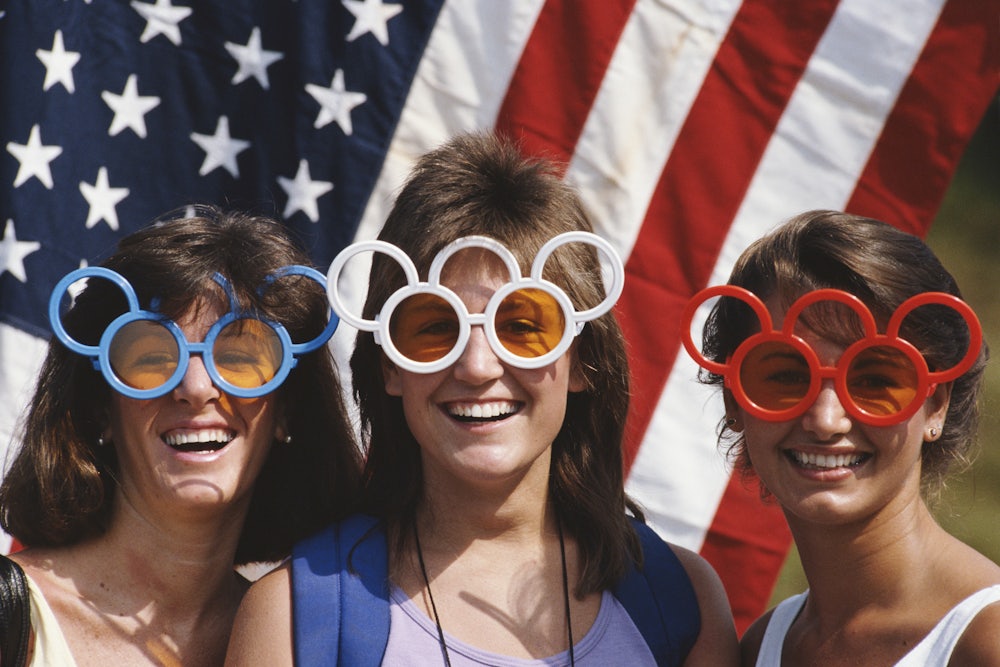Months before the 1984 Summer Olympics, Stefan Kanfer, then a cinema critic for TIME magazine, unleashed a tirade on the bawdy commercialism he felt had come to define the modern Games. “What happened to the Olympic ideal of man against man?” he bemoaned in the New Republic.
Kanfer had a point. That year, the International Olympic Committee raised hundreds of millions in corporate sponsorships, private fundraising, and TV deals. After taxpayers had to foot the bill for the 1976 games that left Montreal $1.5 billion in debt, Los Angeles was the first Olympics in history financed without government funds, forcing committee chairman Peter Ueberroth, a local businessman who founded the second largest travel company in the United States, to squeeze dollars from every possible outlet. ABC paid $225 million for the exclusive rights to broadcast the games over 180 hours, the first time in history that an American network had brokered a domestic rights deal for the games. The host city, Los Angeles, net over $232 million in profit—partly through the frugal use of existing facilities and recyclable, cardboard decorations—making the 1984 Olympics the first to turn a profit since 1932. It is still the most financially successful games in history.
That unbridled commercialism was what Kanfer objected to in a New Republic column titled “The Great Sports Swindle” published in February 1984:
Paavo Nurmi, Eric Heiden, Cassius Clay, Jim Thorpe, Jesse Owens. There have been any number of heroes whose Olympic achievements are written in gold. But all fade in the solar glare of the Emperor Nero. Back in 66, a good year for absolute rulers, he was a competitor at the Olympic Games, in the ten-horse race. Heading around a curve, he had the misfortune to be hurled onto the track. Sycophants immediately restored him to his place, but he was too out of breath and dazed to make it to the finish line. The judges nevertheless awarded him first prize.
We hear a lot these days about the Olympic tradition, mostly from the American Broadcasting Company, which will televise the Games, and from Exxon, Coke, McDonald’s, Levi’s, etc., which will sponsor them. The tradition they mean is twenty-two hours of prime time and an audience of 2.5 billion worldwide watching twelve thousand competitors from 140 nations struggle for individual and team supremacy between commercials. The real tradition, however, is Neronian: the ancient custom of venality, corruption, and bending of the head to the powerful. For those of us who regard the Olympics as the United Nations in Adidas, it is comforting to know that a small and plucky band of Gamesmen have struggled to keep that tradition alive. …
Of every dollar sent to the United States Olympic Committee, 14¢ goes for “administration.” There are doubtless a lot of selfless and dedicated Olympic officials, but it might be diverting to get a look at some of their expense accounts. The U.S.O.C. is hoping for a $10 million share of the Los Angeles Games surplus, and receipts from the Olympic coin program, according to Congressional sources, already exceed $20 million. A corporate tax refund program is still pending in Congress; it could raise as much as $25 million, and that could form the endowment base for the committee’s $100 million budget between now and the next Olympics in 1988. Given these figures, the remark of Bruce Wilhelm, a former world-class weightlifter and member of the committee’s executive board, seems especially poignant: “When I hear talk about a $100 million budget, my question is: what are the athletes getting out of this?” … The endorsement of sneakers and snacks, the relentless claims of the “official” camera, airline, watch, or in the case of Anheuser-Busch, “proud sponsor of the official games” rather than “official beer,” provides sufficient answer.
In the 30 years since then, the cost of staging an Olympics has skyrocketed, from $320 million in 1984 to $51 billion in the 2014 Sochi Winter Olympics. In 2008, a record 63 companies were corporate sponsors of the Beijing Olympics, paying millions for titles like “official home and industrial flooring supplier” or “frozen dumplings exclusive supplier” of the Games.
This year, allegations that corrupt Brazilian officials are lining their pockets with public funds have overshadowed the preparations the 2016 Summer Olympic Games in Rio de Janeiro. Investigators are still searching for federal funds that went missing after being allocated to purify the water in Guanabara Bay, which will host the Olympic sailing events next week. The five Brazilian construction companies that won lucrative contracts to build $10.8 billion in new stadiums and infrastructure in preparation for the games were all embroiled in the sprawling corruption scandal that forced President Dilma Rousseff from office.
Perhaps to avoid such sweeping scandals, South Korean government recently launched a program to root out corruption and monitor the trillions in government spending leading up to the 2018 Winter Olympics in PyeongChang.
“Is there any hope for the Olympics?” Kanfer asked in 1984. “It depends on what you mean by hope. Will they be improved, made free of the circus atmosphere, the exploitation, the international squabbling, the lying and cheating? … Almost from the start the Games have been war by other means, and the rites and wrongos have simply been replaced by other rituals and power brokers.”
